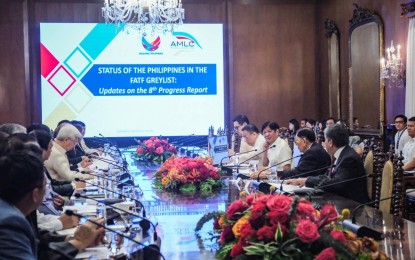
SECTORAL MEETING. President Ferdinand R. Marcos Jr. on Tuesday (Jan. 2, 2024) presides over a sectoral meeting at Malacañan Palace in Manila to discuss the status of the Philippines in the Financial Action Task Force's grey list. He directed all concerned government agencies to immediately act on the eight remaining strategic deficiencies in controlling anti-money laundering and terrorist financing in the country. (Photo from the Presidential Photojournalists Association)
MANILA – President Ferdinand R. Marcos Jr. has directed all concerned government agencies to immediately act on the eight remaining strategic deficiencies in controlling anti-money laundering and terrorist financing in the country.
Marcos gave the directive in a sectoral meeting at Malacañan Palace in Manila on Tuesday morning, as he intends to remove the Philippines from the “grey list” of the financing watchdog Financial Action Task Force (FATF), Anti-Money Laundering Council (AMLC) Secretariat executive director Matthew David said in a Palace briefing.
“The President has reiterated the government’s high-level political commitment and directed all government agencies concerned to swiftly address the remaining strategic deficiencies identified by the FATF in relation to the greylisting of the Philippines,” David said.
“The Philippines is aiming to address all these deficiencies within 2024 and to trigger the exit process from this FATF ‘grey listing,’” he added.
The Philippines failed to meet the January 2023 deadline to address the 18 deficiencies noted by the FATF to exit the grey list.
David noted that the country has already complied with the 10 out of the 18 FATF action items.
Some of the eight remaining action plans that the Philippines needs to fulfill include the demonstration of effective risk-based supervision of Designated Non-Financial Business and Professions; access to beneficial ownership information; enhancement in money laundering and financial investigations and prosecutions; and enforcement of cross-border measures.
David said the eight deficiencies are “still partly addressed,” with one of them “not yet properly addressed.”
“The most challenging action items regarding terrorism financing prosecution, we need to file more terrorism financing cases and the one in charge of complying with this action item is the law enforcement agencies, including the AMLC,” he said.
David said all concerned agencies have expressed their commitment to address the gaps by implementing measures to strengthen the country’s fight against anti-money laundering and terrorist financing.
“Everybody believes we are on the right track and the President has commended the work of different agencies of government. The President also directed the agencies of government to continue with their actions and to continuously sustain good coordination among themselves — between the law enforcement and other government agencies,” he said.
David said the government’s goal is to address the deficiencies and exit the grey list this 2024.
He also clarified that the bid to remove the Philippines from the grey list by January this year is a “self-imposed deadline.”
“Our goal is to eventually exit the grey list. There are repercussions for being in the grey list because the longer we are in the grey list, the bigger the possibility or the higher risk that we will enter the black list,” David said.
He warned that if the Philippines gets blacklisted, it will have an impact on the overseas Filipino workers’ transactions.
“Our OFWs usually send remittances here to their families here in the Philippines. If we will be blacklisted, we are not yet blacklisted, we are still greylisted right now, the FATF will impose countermeasures on the Philippines and international financial transactions of Filipinos abroad,” he said.
“That is, for example, the remittances of our OFWs, there will be an increase in cost, and more requirements, more stringent requirements, or sometimes the transactions may be denied or disapproved. We don’t want that to happen,” David added.
In October 2023, Malacañang issued Memorandum Circular 37, directing all concerned departments, agencies, bureaus, and instrumentalities of the national government to “immediately” and timely formulate and implement relevant strategies, plans and programs to implement the National Anti-Money Laundering, Counter-Terrorism Financing and Counter Proliferation Financing Strategy 2023-2027. (PNA)
